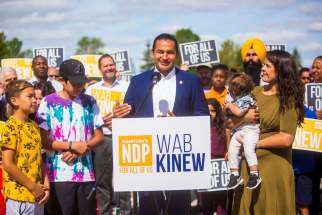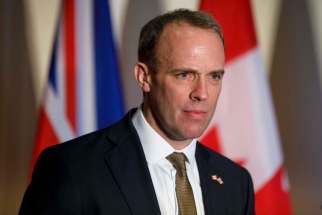As Brexit looms, U.K. trade talk is pointless
Read this article for free:
or
Already have an account? Log in here »
To continue reading, please subscribe:
Monthly Digital Subscription
$0 for the first 4 weeks*
- Enjoy unlimited reading on winnipegfreepress.com
- Read the E-Edition, our digital replica newspaper
- Access News Break, our award-winning app
- Play interactive puzzles
*No charge for 4 weeks then price increases to the regular rate of $19.00 plus GST every four weeks. Offer available to new and qualified returning subscribers only. Cancel any time.
Monthly Digital Subscription
$4.75/week*
- Enjoy unlimited reading on winnipegfreepress.com
- Read the E-Edition, our digital replica newspaper
- Access News Break, our award-winning app
- Play interactive puzzles
*Billed as $19 plus GST every four weeks. Cancel any time.
To continue reading, please subscribe:
Add Free Press access to your Brandon Sun subscription for only an additional
$1 for the first 4 weeks*
*Your next subscription payment will increase by $1.00 and you will be charged $16.99 plus GST for four weeks. After four weeks, your payment will increase to $23.99 plus GST every four weeks.
Read unlimited articles for free today:
or
Already have an account? Log in here »
Hey there, time traveller!
This article was published 07/08/2019 (2321 days ago), so information in it may no longer be current.
Dominic Raab came calling in Toronto this week, asking to reach a quick trade agreement with Canada. He was en route to Washington and Mexico City to make similar pitches to U.S. and Mexican authorities.
On his Toronto stop, Foreign Affairs Minister Chrystia Freeland asked for his help getting Canadian hostages out of China, offered friendly generalities about Canada-U.K. trade and sent him on his way. In Washington, President Donald Trump expressed enthusiasm about U.S. ties with the U.K., Mr. Raab reported, and then sent him to see Vice-President Mike Pence.

Mr. Raab is foreign secretary in the newly installed government of British Prime Minister Boris Johnson. This new government talks volubly but vaguely about the fabulous economic opportunities they believe will be available once Britain is out of Europe.
Mr. Johnson’s policy is to end British membership in the European Union by Oct. 31, with or without an agreement on the Irish border, on rights of Britons in Europe and Europeans in Britain, on transitional trade terms and on who pays for what in the meantime.
Many Britons are wondering what their lives will be like if Mr. Johnson leads them over the cliff into a no-deal Brexit. Mr. Johnson and Mr. Raab are eager to reassure them that Britain has plenty of other friends — in Canada, the U.S. and Mexico, for instance — if the EU does not provide them a soft landing.
One difficulty in dealing with Mr. Raab and his prime minister is that they may not be in office much longer. The U.K. parliament has repeatedly refused to accept the divorce terms negotiated by former prime minister Theresa May and has also refused to accept exiting the EU without a deal. The EU has repeatedly said it will not renegotiate the terms previously agreed to by Mrs. May. Mr. Johnson’s party lost the first byelection test it faced since taking office. He may easily be forced into a general election, and there’s no way of knowing what manner of government would result.
Canada should wish Britain the best of luck, and we should look forward to a day when Britain will have a government that seems likely to survive a few years and has a coherent policy that enjoys public support.
With the best will in the world, there’s not much Canada can do to extract the U.K. from the frightful situation it has constructed for itself. Even if we invited the U.K. to join the free-trade area uniting Canada, the U.S. and Mexico, the gesture would be meaningless because this U.K. government has no political authority to commit the country to anything.
The prime minister who won the last U.K. election has been dumped by her own party and the new prime minister — the one who wants to jump off the cliff — lacks public support for his plan.
In these conditions, Canada should stand at a safe distance from the British train wreck. Canada should wish Britain the best of luck, and we should look forward to a day when Britain will have a government that seems likely to survive a few years and has a coherent policy that enjoys public support.
When that day comes, Canada should be happy to negotiate a transatlantic trade deal. It might be like our NAFTA treaty with the U.S. and Mexico, or it might be like our CETA treaty with Europe — either might be advantageous to the parties involved.
Beyond vague generalities and hopes for a better future, however, Canada is not the solution to Britain’s current problem. Britain put itself into this box, and Britain is going to have to find the way out of it.









